#but it does convey a very distinct and unique feeling that I don't know other good quick ways to express
Explore tagged Tumblr posts
Text
It has just crossed my mind that I unironically say "owo" as a sound of intrigue or interest, or just a way to convey the feeling of "huh. *blink*" after someone says something and I'm not quite sure what to say in response.
#owo#just caught myself thinking “owooooo?!?!!” right after reading a highly intriguing character analysis#it's been in my vocabulary for years but have just tried not to think about it too much#considering its origins#but it does convey a very distinct and unique feeling that I don't know other good quick ways to express#like “oh?????” but a bit more... distinct?#idk how to describe it rn I'm tired
1 note
·
View note
Text
But who made Lewis do it, to bet on a Ferrari that's been losing for almost two decades?
Leo Turrini interviews Aldo Costa about working with Hamilton and Schumacher
A vegan menu is already ready at [Ristorante] Montana. Guess for whom.
While waiting to enjoy it in the company of the person to whom it will be dedicated (the menu), I chatted with a gentleman who has known those two up close and personal. Aldo Costa, my dear friend.
Costa: "Michael Schumacher and Lewis Hamilton have a lot in common. But there are also significant differences between them. However, it is beautiful that the two most successful drivers in F1 history have chosen to link their name to Ferrari."
Aldo Costa, now technical director of the wonderful Dallara ("From the Parma hills we deal with 17 automotive projects, from IndyCar to Formula E"), Aldo Costa, I said, is the only Top engineer to have worked with both Schumi and with Hamilton. At Maranello he was part of the Dream Team of Montezemolo and Todt. In Mercedes, he won everything and more with Lewis.

Engineer, who is better between the two?
Costa: "I refuse to answer, this is a provocation. I want to say right away that Michael and Lewis are less far apart than you might imagine. Both have always had a very analytical approach to things off track. They are meticulous, very professional. They know that at certain levels it's the details that shift the balance, that determine the outcome."
From the outside Schumi looked like a robot, an alien....
Costa: "Wrong impression! Michael was very human in the work. He would sit there with the engineers and calmly convey his feelings about the car he was driving. He was never obsessive, that's it."
In contrast, Hamilton?
Costa: "Same dough. Lewis I got to know better, because in Mercedes I had a role that put me in more direct contact with the driver. He and I were symbiotic. Hamilton, like Schumi, asks for trust and trusts you."
That must be why the two of them won 14 world titles.
Costa: "So. Then, of course, they are also distinct and distant from each other."
In what sense?
Costa: "You see, they belong to non-overlapping cultures. Can I give an example? Schumacher was the last driver of an era when cars were developed on the track, through continuous testing on the asphalt. And in this he was formidable, unique I dare say."
Hamilton was not.
Costa: "No. Lewis belongs to the time of the simulator.They changed the rules. In short: Michael was always behind the wheel, Hamilton almost never because he can't. Not surprisingly, Schumi when he returned to racing in 2010, with no more circuit testing, he had a bad time. He, the simulator, just really hated it."
But other than that, the substance, I mean as achievements and victories, has not changed.
Costa: "Indeed, because we are talking about two Phenomena! I will give you another example. Schumi determined tire development with his testing, because he could do it. In Hamilton's era, the tires are baptized first by the sole supplier, and the greatness of the driver lies in his ability to make the most out of tires right away that he does not know, that he did not have a hand in choosing beforehand. And in this he is an absolute master, as Michael was in his world."
But who made Lewis do it, to bet on a Ferrari that's been losing for almost two decades?
Costa: "Well, he is an instinctive one. He followed his heart. It's not a turn dictated by the God of money."
But what are the chances that...
Costa: "I won't answer here. In Maranello they know they have a lot of things to fix..."
Does he think Hamilton will pull in technicians he trusts from the Mercedes school?
Costa:"I don't know. When he came over to Mercedes in 2013, leaving McLaren, he presented just himself. They called him crazy, but you know how it went."
One last thing, dear Costa. Since everyone understood that in 2011 the Ferrari made an own goal by torpedoing you from the role of technical director, in short , yes, would you go back to Maranello with your friend Lewis?
Costa: "No. I am happily ... married to engineer Dallara, by the way we collaborate with the Cavallino on the Le Mans project."
Hamilton will win without Costa.
Costa: "For the good it brings him, I wish him well."
#lewis hamilton#michael schumacher#aldo costa#ferrari#f1#red team signs lh#preseason#2024#leo turrini#mercedes amg f1#racecar design and engineering#translated from the italian via deepl
26 notes
·
View notes
Note
Any thoughts design-wise on the Beldum line?
(This is the last request in the inbox right now. Send 'em if you got 'em, otherwise I might just do some randomly generated picks.)
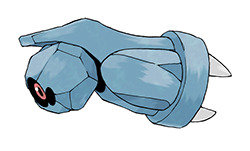
I find it disappointing that GameFreak did a non-dragon like pseudo-legendary one (1) time and then never again. I like dragons as much as the next person, but why exactly does every pseudo-legendary have to be one nowadays? It would be like if every legendary was a psychic-type.
But part of the reason I find it disappointing is that the one time they did do a non-dragon pseudo, it absolutely slapped. Beldum hear is this bizzaro, alien-like magnetic creature with a single eye and claws on its end. I'm not even sure what it's supposed to be (I guess it's vaguely dumbbell-ish, based off its Japanese name), but it's such an interesting monster that's almost ultra-beast like in its presentation.
Visually, the body shape has this great scraggly look to it that I really like (Gen 3 has a lot of these. Solrock and Regirock are two other examples), and the red eye with a black background really pops against the blue body. I'm not sure why it has another hole by the eye, but it does give it a nice sense of visual asymmetry.

Metang makes it clear what this line's going for, and it's really cool—each stage fuses together, so two Beldums make a Metang, two Metang's make a Metagross, etc. I'm not a huge fan of evos where they just copy/paste the same Pokemon twice, so this is a good solution that's in the same spirit but actually gives us a unique design.
Also, because of this gimmick, Metang does a good job of transitioning between stages but also being its own thing. It's the only one of the line to sport only two arms, each one obviously a former Beldum, and it also sports these claw-like structures and horns that none of the rest of the line have.

Visually, it keeps most of the things I liked about Beldum, like the striking red-and-black eyes and the chiseled body shape. The only thing that I don't care for is the horns on the front and back of the body; they feel a bit tacked on, and I don't think it needed them considering it still has the claw structures on the sides of the body.

And, unsurprisingly, Metagross itself is really cool. It now has four legs, arranged less like a quadruped and more like an arachnid of some kind, which makes for a really distinct body shape and silhouette. The four limbs also help convey the combination theme, with it being made of two Metangs this time.
Another cool thing about it is that it has the intelligence of a super computer, now having four brains working in tandem. That's a nice extension of the concept and gives it a bit of personality beyond just being a cool metal thing.
Per the other stages, it also keeps the same good elements, creating a sense of consistency. The new element is a large X across the face, and while I have no idea where that came from, it really works. Just a great 'mon all around, very refreshingly abstract and plenty powerful looking.

Metagross also got a mega form. It's not terrible, but I do think it's the weakest of the line, on the grounds that it's just entirely too messy and visually busy. I get what they were going for, as the 'dex states that this is another fusion between one Metagross, one Metang, and two Beldum (why not two Metagross? that would've made more sense given the previous patterning):

This is a good idea in theory, as it gives it a meaningful theme and reason to exist, instead of just being a regular Metagross with Stuff tacked onto it. However, it doesn't make a whole lot of sense lore-wise with what we know about mega evolution (needing others from the line to mega-evolve a Metagross would actually be a cool mechanic, though a bit of a pain), and it's just way too much.

In addition to rotating the front limbs so they face forward (probably to match the X shape on the face, also because this debuted in XY), it also adds four extra limbs in the back (because of the combo thing), Metang's extra claws and horns, two holes on the face (probably Metang's eyes), and it's all just A Lot. I think the problem is that it tries to integrate too many elements; Metagross just keeps the limbs but none of Metang's accents, so the mega probably could've just had the eight limbs (maybe the four in the front are reflected in the back, to create a pattern) and dropped the extra claws and horn.
All that said, it is good conceptually, the addition of gold to the palette works nicely and makes the X really pop, and the actual arrangement of the limbs is interesting. If you can ignore the excessive details, there's a good concept here.
So overall, the main line is incredibly strong—cool design, strong concept, unique design and body shape. There's a good sense of consistency between the stages, and each stage is distinct in their own way. The only weak part is the mega, and that's just due to a bit too much detail.

(Also, final side note: the shinies for this line slap.)
65 notes
·
View notes
Text
Identity
I find it bothersome to an extent that one is so frequently without a sense of self. To not exist in reality, to not be your own person, to not have your own person to be.
Frequently we will find ourselves aimless in existence. What is there to do? What is it that one is interested in? What can the void of time be filled with to keep oneself occupied and entertained? What is it that I like and enjoy?
I think I know what it is I like, that I learned it swiftly before any suggestions were made from our ask. I believe that I enjoy writing. Language, words, making things sound charming and eloquent... I enjoy it. I may not be a poet but I wish to convey with the words I use that which I feel, think, experience. So yes, I enjoy writing.
But then what do I write?
I have not thought it until just now, merely two paragraphs in the past. But my desire to write, the fact it calls to me, is still quite aimless. As has always been the case with our desire to create: what would the subject matter be?
I suppose it does not help that one takes it poorly to find something similar to their own work, not wishing to be seen as a copy nor to be copied. To be unoriginal is to die.
Is it strange to never have a sense of self? Perhaps not. But it is so, so very challenging to discover that which makes one unique, to uncover the aspects that have been buried due to necessity. Due to a lack of resources, lack of support.
I do not know it if we are indeed separated, dissociated, enough to have DID. But we are long past the point of return. One does not feel comfortable saying "my hair" in the mirror--I know, for we tried moments ago. It feels as though we do not dissociate enough.
And yet as I say such a thing, suddenly I am observing the mental image, memory or present, of the void aura that extends from us, making the space feel strangely separate, showing me that we are in fact dissociated. But it is only natural now, as we are focusing primarily on writing this post.
I would say the dissociation is not severe, but... I am also reminded instantly that severity can be in frequency and intensity. It may not be intense dissociation that causes great distress, but it is frequent, near all day every day.
If only one knew what it were like to be truly, fully present in reality, tethered to the ground instead of hovering just above it. If only one could ever comprehend the idea that I am a single unit, a whole, rather than a fractured self.
It has always been more comfortable to think of oneself as parts of a whole, that there is simply other versions of me, and to never have been connected enough to the self to have any distinct self.
My interests, identity, never mattered. I have always been, always was, a conglomerate of reactions. I always considered myself passive, reactive, because that was how I floated through life. I could never be active, assertive. Nobody particularly cared enough to ask me of myself. It was only ever an interjection, a 'by the way'. And nobody cared to listen. So I was a ghost.
It has taken 20 years to finally start to see myself. To realize I can be more than a blank canvas. It may be torn, scrapped together, cut open in places and scratched or stretched in others, but that is me. And I don't have to be blank forever, as beautiful as I always find them to be. Maybe it is worth experimenting sometimes.
#I believe that when the perspective began to become first person; it was no longer me (👑). But it is true nonetheless for us all.#I will admit that early on in the 'brain dump' I had considered the topic of writing monsters in response to what I would enjoy as a subject#The perspective change were accompanied by feelings by the way. Somber nostalgia. How sad to remember the self is split as such.#Mourn the child who had thought they simply had different selves based on who they were around that never had an identity to notice changing#gilded texts#bespoken wishes#<- a new tag for most personal posts and things that one does not consider 'gilded texts'
0 notes
Text
"Give Up Halfway" - A song that mocks the idea of eternal love (2018)
Composer & Lyricist: Pan Xieqing Singer: Faye Wong Arranger: Wang Yumin Producer: Alvin Leong, Faye Wong Album: Sing and Play Published: 1998 Publisher: EMI Interviewee: Pan Xieqing Author: Wang Jingxin
In 1995, after Wang Jingwen changed her name back to Faye Wong, she took more risks in music. After she became a producer, her musical personality became more distinct. With outstanding achievements, Faye Wong has always been a shining superstar in the Chinese music industry and has never faded.
In 1998, after giving birth, her "Sing and Play" album was a very successful comeback. The entire album contained only one ballad "Red Bean", the rest were "non-love songs". "Give Up Halfway" is a song that boldly mocks the idea of love being eternal, reflecting Faye Wong's unique personality when compared to other female singers.
Pan Xieqing, the songwriter of "Give Up Halfway" exclaimed: "I love Faye Wong to death!" It turned out that since her 1993 album "No Regrets", Pan Xieqing liked Faye Wong very much and wrote songs for her with the mentality of a super fan. "It was one of my wishes to collaborate with Faye Wong," he said. "I have studied her music, her singing, her voice, and her qualities for a long time, so writing songs for Faye Wong was the least difficult of all my creations."
Pan Xieqing said that at that time, many friends around him were trapped in relationships, therefore real subject matter was easily available. "I used Faye Wong's unique tone to remind men and women in the world of one thing amidst emotional turmoil: if you hesitate, sooner or later you will give up halfway."
It was really rare to find preaching in a pop song that sounded so happy and catchy. "It just so happened that Faye Wong asked me for a song and she was the perfect person who could express what I wanted to say." The person who does the preaching is important, so Pan Xieqing conveyed the words and insights through Faye Wong, who has a unique and intellectual image. Regardless of the melody from the demo to the later album version, Faye Wong kept everything intact. Pan Xieqing said: "This is another reason why I love Faye Wong to death: she respects every musician."
"While writing this song, I pictured the river and sea." Pan Xieqing recalled that "Give Up Halfway" was written standing up. "When the emotions came to me, I had to complete it while moving [my body]. This song flows, like a river." In fact, just listen to the melody’s sudden ups and downs and it is very obvious, “Like the hesitation in the emotions of men and women, when the river rolls and winds its way to the chorus, it is a moment of relief when the sea appears.” The turbulent sea turns up wave after wave and finally spreads out on the beach. The creator uses the metaphor of waves and the beach. When listening to the song, the subtle words and righteousness is still conveyed in a way that makes people smile knowingly.
Listening to Faye Wong's songs is very enjoyable because you can always hear feelings that so-called mainstream songs rarely touch. ["How could life be boundless if you don't have freedom? / That's really your own fault, your self-pity"] The lyrics satirizes traditional love songs about pledging to love each other to the death. In fact, such lyrics can be found in the song "I'm Willing" from Faye Wong's "Mystery" album. Pan Xieqing said: "People are cheap when it comes to love." ["Coveting happiness is tantamount to depravity. You say that you don't live for love, don't make excuses! In the end, after all that trouble, you don't know what it was for."] These lyrics convey irony. They seem to be indifferent but when you look at yourself in the mirror, you will cry and scold yourself. "It seems to be talking about the other party, but it is actually a dialogue with myself. So every word is brutal and slaps you in the face one by one. I am full of longing for love, but I don’t want to face it head-on.” Pan Xieqing pointed out that in many love affairs, one cares more about their own feelings than the other party's feelings. "To make such accusations, how can it sound pleasing to your ears? So I used the light melody as a contrast to carry out the harsh advice." Pan Xieqing concluded, "Give Up Halfway" wants to say: "We are all living for love. So we need to be more wiser to be happy."
"Nowadays I am involved with designing, planning, and human resource integration." Speaking of his recent situation, the self-deprecating Pan Xieqing laughed at himself for not having a proper job. He said frankly, many friends asked why he stopped writing songs? "Actually, I am still writing. It's just that music is not my job. It's a hobby! When my friends ask me to write, I will do it if I'm interested." He likes to see the realization of each piece of work with all his heart and soul, and treats everything as his own, as a kind of creation.
Maybe you can use the lyric "Don't worry, I will take good care of myself" from "Fly", another song he wrote for Faye Wong in the album "Sing and Play", to comfort all those who have given up halfway on the road of love.
——————————————————————
SOURCE: MUSIC COPYRIGHT SOCIETY OF CHINESE TAIPEI // TRANSLATED BY: FAYE WONG FUZAO
0 notes
Note
So, I don't think I've ever asked you this... what IS the whole point of the Spider-Sense? It really seems like something that only exists for writers to ignore or work around when they want to inject Legit Tension into a story.
I’ve thought about this power so much, but never with an eye to defend its right to exist, so I needed to think about this. The results could be more concise.
Ironically, given the question, I have to say its main purpose is to ramp up tension. But it’s also a highly variable multitool that a skilled creative team can use for...pretty much anything. It does everything the writer wants it to, while for its wielder always falls just short of doing enough.
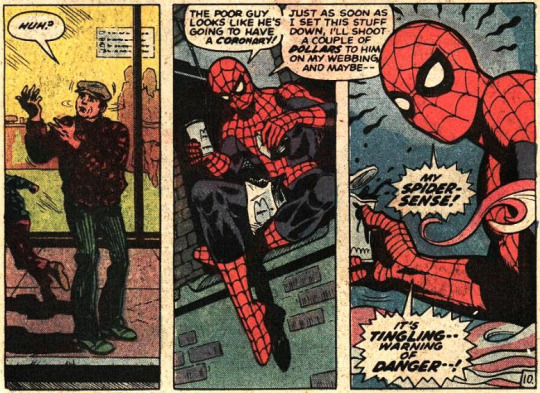
I went looking through my photos for a really generic, classic-looking example to use as an image to head this topic, but then I ran into the time Peter absolutely did not reimburse this man for his stolen McDonald’s, so have that instead.
A Scare Chord, But You Can Draw It
That one post that says the spider-sense is just super-anxiety isn’t, like, wrong. It’s a very anxious, dramatic storytelling tool originally designed for a very anxious, dramatic protagonist. I find it speaks to the overall tone of the franchise that some characters are functionally psychics, but with a psychic ability that only points out problems.
Spidey sense pinging? There’s danger, be stressed! Broken? Now the lead won’t even KNOW when there’s a problem, scary! Single character is immune to it? That’s an invisible knife in the dark oh my god what the fuck what the fU--
Like its counterpart in garden variety anxiety, the only time the spider-sense reduces tension is in the middle of a crisis. But in the wish fulfillmenty way that you want in an adventure story to justify exaggerated action sequences, the same way enhanced strength or durability does. Also like those, it would theoretically make someone much safer to have it, but it exists in the story to let your character navigate into and weather more dangerous situations.
For its basic role in a story, a danger sense is a snappy way to rile up both the reader and the protagonist that doesn’t offer much information beyond that it’s time to sit smart because shit is about to go down.
Spidey comic canon is all over the board in quality and genre, and it started needing to subvert its formulas before the creators got a handle on what those formulas even were, and basically no one has read anything approaching most of it at this point, so for consistent examples of a really bare bones use of this power in storytelling, I’d point to the property that’s done the best job yet of boiling down the mechanics of Spider-Man to their absolute most basic essentials for adaptation to a compelling monster of the week TV series.
Or as you probably know it, Danny Phantom. DON’T BOO, I’M RIGHT.
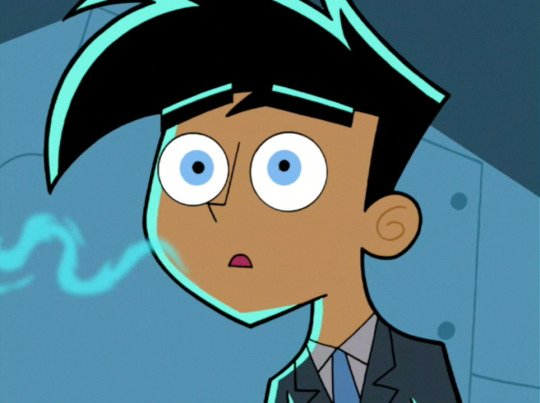
DP is Spider-Man with about 2/3 of the serial numbers filed off and no death (ironically), and Danny’s ghost sense is the most proof in the formula example of what the spidey sense is for: It’s a big sign held up for the viewer that says, “Something is wrong! Pay attention!” Effectively a visual scare chord. It’s about That Drama. And it works, which won it a consistent place in the show’s formula. We’re talking several times an episode here.
So why does it work?
It’s a little counterintuitive, but it’s strong storytelling to tell your audience that something bad is going to happen before it does. A vague, punchy spoiler transforms the ignorant calm before a conflict into a tense moment of anticipation. ...And it makes sure people don’t fail to absorb the beginning of said conflict because they weren’t prepared to shift gears when the scene did. Shock is a valuable tool, too, but treating it like a staple is how you burn out your audience instead of keeping them engaged. Not to go after an easy target, but you need to know how to manage your audience’s alarm if you don’t want to end up like Game of Thrones.
The limits of the spider-sense also keep you on your toes when handled by a smart writer. It tells Peter (everyone’s is a little different, so I’m going to cite the og) about threats to his person, but it doesn’t elaborate with any details when it’s not already obvious why, what kind, and from what. And it doesn’t warn him about anything else-- Which is a pretty critical gap when you zoom out and look at his hero career’s successes and failures and conclude that it’s definitely why he’s lived as long as he has acting the way he does, but was useless as he failed to save a string of people he’d have much rather had live on than him.
(Any long-running superhero mythos has these incidents, but with Peter they’re important to the core themes.)
And since this power is by plot for plot (or because it’s roughly agreed it only really blares about threats that check at least two boxes of being major, immediate, or physical), it always kicks in enough to register when the danger is bearing down...when it’s too late to actually do anything about it if “anything” is a more complex action than “dodge”.
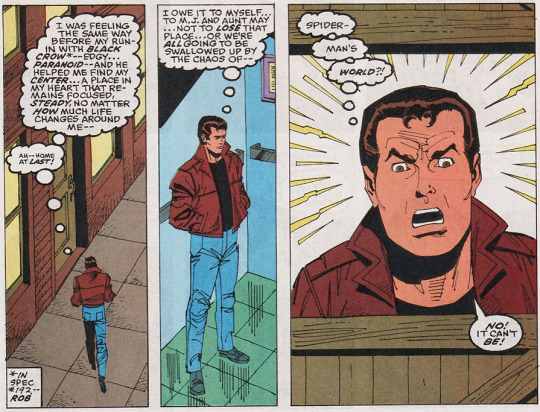
Really? Not until the elevator doors started to open?
That Distinctive, Crunchy Spider Flavor
The spider-sense and its little pen squiggles go hand in hand with wallcrawling (and its unique and instantly identifiable associated body language) to make the Spider-Person powerset enduringly iconic and elevate characters with it from being generic mid-level super-bricks. Visually, but also in how it shapes the story.
I said it can share a narrative role with super strength. But when you end a fight and go home, super strength continues to make your character feel powerful, probably safer than they’d be otherwise, maybe dangerous.
The spider-sense just keeps blaring, “Something’s wrong! Something’s wrong! God, why aren’t you doing something about this!?”
Pretty morose thing to live with, for a safety net! Kind of a double edged sword you have there! Could be constantly being hyperattuned to problems would prime you for a negative outlook on life. Kind of seems like a power that would make it impossible for a moral person to take a day off, leading them into a beleaguered and resentful yet dutiful attitude about the whole superhero gig! Might build up to some of the core traits of this mythos, maybe! Might lead to a lot of fifteen minute retirement stories, or something. Might even be a built in ‘great responsibility’ alarm that gets you a main character who as a rule is not going to stop fighting until he physically cannot fight anymore.

Certainly not apropos of anything, just throwing this short lived barely-a-joke tagline up for fun.
One of my personal favorite things about stories with superpowers is keeping in mind how they cause the people who have them to act in unusual ways outside of fights, so when you tell me that these people have an entire extra sense that tells them when the gas in their house is leaking through a barely useful hot/cold warning system that never turns off, I’m like, eyes emojis, popcorn out, notebook open, listening intently, spectacles on, the whole deal.
It also contributes to Peter Parker’s personality in a way I really enjoy: It allows him to act like an irrational maniac. When you know exactly when a situation becomes dangerous and how much, normal levels of caution go out the window and absolutely nothing you do makes sense from an exterior standpoint anymore. That’s the good shit. I would like to see more exploration of how the non-Parker characters experiencing the world in this incredibly altered way bounce in response.
It’s also one of many tools in this franchise hauling the reader into relating more closely with the main character. The backbone of classic Spidey is probably being in on secrets only Peter and the reader know which completely reframe how one views the situation on the page. It’s just a big irony mine for the whole first decade. A convenient way to inform the reader and the lead that something is bad news that’s not perceivable to any other characters is youth-with-a-big-exciting-secret catnip.
Another point for tension, there, in that being aware of danger is not synonymous with being able to act on it. If there’s no visible reason for you to be acting strange, well...you’re just going to have to sit tight and sweat, aren’t you? Some gratuitous head wiggles never hurt when setting up that type of conflict.
Have I mentioned that they look cool? Simultaneously punchy and distinctive, with a respectable amount of leeway for artists to get creative with and still coming up with something easily recognizable? And pretty easy to intuit the meaning of even without the long-winded explanations common in the days when people wrote comics with the intent that someone could come in cold on any random issue and follow along okay, I think, although the mechanic has been deeply ingrained in popular culture for so long that I can’t really say for sure.
It was also useful back in the day when no artists drew the eyes on the Spider-Man mask as emoting and were conveying the lead’s expressions entirely through body language and panel composition. If you wiggle enough squiggles, you don’t need eyebrows.
Take This Handwave and Never Ask Me a Logistical Question Again
This ability patches plot holes faster than people can pick them open AND it can act as an excuse to get any plot rolling you can think of if paired with one meddling protagonist who doesn’t know how to mind their own business. Buy it now for only $19.99 (in four installments; that’s four installments of $19.99).
Why can a teenager win a six on one fight against other superhumans? Well, the spider-sense is the ultimate edge in combat, duh.
Why can Peter websling? Why doesn’t everyone websling? Well, the spider-sense is keeping him from eating flagpole when he violently flings himself across New York in a way neither man nor spider was ever meant to move.
How are we supposed to get him involved with the plot this week???? Well, that crate FELT dangerous, so he’s going to investigate it. Oh, dip, it was full of guns and radioactive snakes! Probably shouldn’t have opened that!
Yeah, okay, but why isn’t it fixing everything, then? Isn’t it supposed to be why Peter has never accidentally unmasked in front of somebody? ('Nother entry for this section, take a shot.) That’s crazy sensitive! How does he still have any problems!? Is everything bad that’s ever happened to characters with this powerset bad writing!? --Listen, I think as people with uncanny senses that can tell us whether we are in danger with accuracy that varies from incredible to approximate (I am talking about the five senses that most people have), we should all know better than to underestimate our ability to tune them out or interpret them wrong and fuck ourselves up anyway. I honestly find this part completely realistic.
*SLAPS ROOF OF SPIDER-SENSE* YOU CAN FIT SO MANY STORIES IN THIS THING
The spider-sense is a clean branch into...whatever. There is the exact right balance of structure and wishy-washiness to build off of. A sample selection of whatevers that have been built:
It’s sci-fi and spy gadgets when Peter builds technology that can interface with it.
It’s quasi-mystical when Kaine and Annie-May get stronger versions of it that give them literal psychic visions, or when you want to get mythological and start talking about all the spider-characters being part of a grand web of fate.
Kaine loses his and it becomes symbolic of a future newly unbound by constraints, entangled thematically with the improved physical health he picked up at the same time -- a loss presented as a gain.

Peter loses his and almost dies 782 times in one afternoon because that didn’t make the people he provoked when he had it stop trying to kill him, and also because he isn’t about to start “””taking the subway’’””’ “‘’“”to work”””’’” like some kind of loser who doesn’t get a heads up when he’s about to hit a pigeon at 50mph.
Peter’s starts tuning into his wife’s anxiety and it’s a tool in a relationship study.
It starts pinging whenever Peter’s near his boss who’s secretly been replaced by a shapeshifter and he IGNORES IT because his boss is enough of an asshole that that doesn’t strike him as weird; now it’s a comedy/irony tool.
Into the Spider-Verse made it this beautiful poetic thing connecting all the spider-heroes in the multiverse and stacked up a story on it about instant connection, loss, and incredibly unlikely strangers becoming a found family. It was also aesthetic as FUCK. Remember the scene where Miles just hears barely intelligible whispering that’s all lines people say later in the film and then his own voice very clearly says “look out” and then the room explodes?? Fuck!!!!
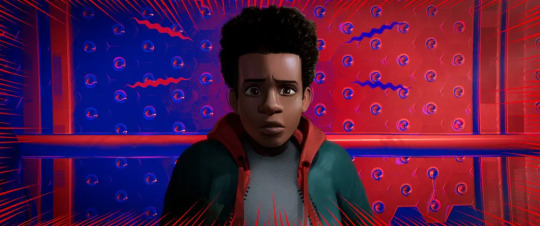
Venom becomes immune to it after hitchhiking to Earth in Peter’s bone juice and it makes him a unique threat while telling a more-homoerotic-than-I-assume-was-originally-intended story about violation and how close relationships can be dangerous when they go sour.
It doesn’t work on people you trust for maximum soap opera energy. Love the innate tragedy of this feature coming up.
IN CONCLUSION I don’t have much patience for writers who don’t take advantage of it, never mind feel they need to write around it.
#spiderman#peter parker#spiderverse#spidey#marvel#danny phantom#one day you'll see what i'm doing with it in the project i'm collabing on w/ my brother and then you'll all be sorry and hopefully impresse#mirrorfalls#asks answered#essays
1K notes
·
View notes
Text
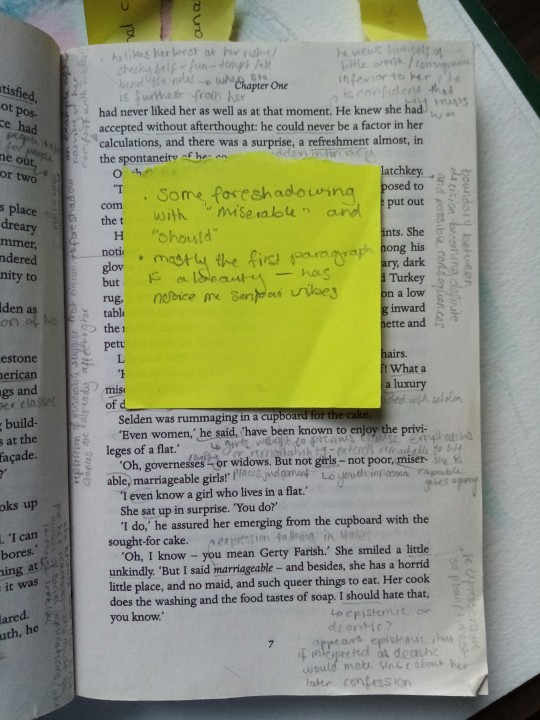
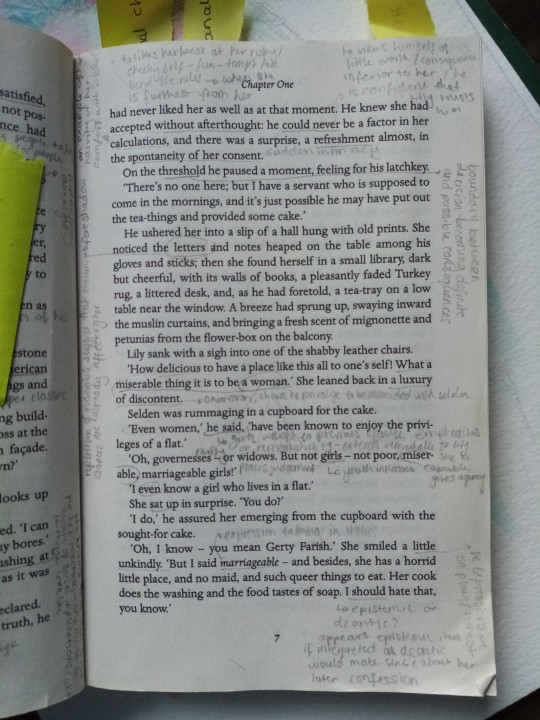
Page 7
In truth, he had never liked her as well as at that moment -> Selden's affections here are plain to see, made so especially by subordinate clause 'in truth' which conveys an honesty and freshness about his feelings. Most importantly, he likes her when she is being her true self, unconventional, and willing to take risk. It's likely informed by his disillusion with high society and finding commonality in someone willing to disregard its etiquette. This is where Lily is unique.
There's also this sense that Selden likes Lily because she is impulsive and this sparks his curiosity to try and understand why she does the things she does-- understand Lily as a person.
He knew she had accepted without afterthought: -> This reaffirms Lily's lack of hesitancy, which alludes to how willing she is to be in Selden's company. It also shows how comfortable she is with him as she is aware of the rumours that could occur but never merits them with being a possibility, showing great trust.
Alternatively, being aware of the risks and having not afterthoughts could suggest that she doesn't fully understand the risks' depth and nuance as in future the situation at Monte Carlo would suggest, but I'm getting ahead of myself.
he could never be a factor in her calculations -> there's a colon that separates this clause from the previous one which suggests this is an explanation for Lily's certainty. To me this would point more towards Lily not really associating the risk of rumours with Selden because she trusts him so much. i.e she does not think of him when she thinks of the risks. But given that they are going up to his apartment it seems strange that Selden would not think himself a factor in her decision. It's therefore possible that he thinks that Lily does not think of him worthy of great consideration.
Also the noun 'calculations' would suggest a lot of thought had gone into the decision where it was previously implied it was one of impulse. This seems like Selden thinks that Lily is playing an intricate game, which further demonstrates his curiosity about her and need to understand her.
there was a surprise, a refreshment almost, in the spontenaity of her consent -> This further contrasts Selden's perception of Lily's 'calculations' and I think the narration is a fine weave between objective reality--where Lily is impulsive-- and Selden's subjective perceptions-- where Lily appears impulsive but there is something more complex informing her decisions. I think this is meant to show that Selden is blinded somewhat by his affections for Lily, seeing things deeper than what are there or what everybody else sees. Alternatively, we as the reader lack Selden's sight into the complexities of Lily and so she is introduced to us as other people see her, which isn't well at all, and we have to learn how Selden sees her. It's a challenge to care for Lily as he does.
The spontaneity invokes a light hearted and refreshing feeling of being in love which mirrors the honest of truth mentioned earlier.
So there's Selden's surprise at Lily being so spontaneous which draws back to a previous point about she is unique for being impulsive almost reckless. It's like we get a sense of her character and her environment from how the two are at odds with each other. Lily is impulsive; noone else of her class should be like that. In a way that makes her free from the system and yet shows her struggle against it but ultimately her struggle will be more defining.
She noticed the letters and notes heaped on the table -> I assume that this is a reference to future letters although I don't know if they would be the same ones. If they were, I don't even have the mental capacity to unpack that. Just the thought that Lily's fall is inevitable, that even when she is happy, having a nice time, an unknown omen lurks within the same room that will bring her sorrow... oh its symbolic, for sure. But I don't want to think about it.
Lily sank into one of the shabby leather chairs -> the verb 'sank' shows how at home Lily really is with this kind of surroundings, how the shabby whilst not fashionable or expensive, is comfortable. From this we and the the pile of letters we get an image of a a slightly disorderly but well-lived in home. This is one of the tragedies where we see the possibility of what her future with Selden could look like where it is unconventional but Lily is comfortable at home even with it.
"How delicious to have a place like this all to oneself! What a miserable thing it is to be a woman," -> I love Lily's exaggerated turns of phrases like 'delicious' and the exclamations; I think Wharton's emphasis on these exaggerations is to capture Lily's innocence through her speech by making it similar to that of a child who is easily excitable.
Again with the exaggeration but this time with 'miserable', we get the sense that Lily has found the world difficult as a woman to live in but miserable seems too strong of a word, certainly at this stage in the book and is sort of hidden within her other hyperbolised expressions. Maybe this creates a kind of cry-wolf situation where, when Lily properly starts to struggle, people don't take notice not only because it wasn't the done thing to do to talk about struggles but also because of her melodramatic personality, everyone thought the same stuff was happening as it had before and Lily was making a big fuss over nothing.
There is repetition of 'miserable' in association to being of female sex further down the page which is another example of Lily's melodrama. But at this point we as a modern audience start to question if she is actually alright (or at least I did). I'm not sure if a contempary audience if the time would have given the strict taboo over discussing any kind of struggle financial/physical health etc. let alone the discussion of mental health. From the impression I get of the time, the only real source of outlet for people struggling with mental health beyond self medication was art, which makes me wonder as to the position Wharton is writing this from.
she leaned back in a luxury of discontent -> The juxtaposition of 'luxury' and 'discontent' raises an important theme that wealth does not equate happiness and that Lily is not happy as a socialite but happy in the company of Selden, and that actually money is the source of Lily's unhappiness. In this specific context, she is lamenting her lack of freedom to live the lifestyle that Selden does.
"Even women," he said "Have been know to enjoy the privaledges of a flat." -> Putting the discourse marker directly after the subject of 'women' breaks it apart from the rest of the sentence and emphasises the extraordinariness of women being able to live independently. But it also raises the possibility of it and suggests that Selden thinks Lily is extraordinary and unconventional enough to achieve the possibility if she chose to.
"Oh governesses– or widows. But not girls– not poor, miserable, marriageable girls!" -> Again we have the breakdown of womanhood into distinct classes like governess, widows, and girls,which creates the idea that there's no intersections between any of them and is a reflection of of societies fixation for categorisation which loses sight the complexity of situations and problems. And it also makes it easier to place social stigmas like those on governesses and widows. Those stigmas are made apparent here but in contrast to how Lily describes girls, being a governess or a widow seems desirable.
In the list of adjectives 'poor, miserable, marriageable', marriageable is equated to these other adjectives and we see that Lily associates marriage with a poverty of kind, of the heart.
It's also interesting that Lily talks about herself as a girl where Selden speaks of her as a woman. Lily plays up her innocence as she has probably been taught to to make desirable marital match, but with that Lily carries around an air of immaturity and naïvity; she's still very child-like. Perhaps that's a part of her that's trying to cling to her youth so she doesn't have to face her future where she will need to marry to survive. Lily sees her adulthood as a constraint on her and her desires whereas Selden sees her potential.
"you mean Gerty Farish," she smiled a little unkindly. "But I said marriageable–" -> Okay so definitely a little tone deaf on Lily's part buts she's honest to a fault and her honesty is refreshing and entertaining.
I'm no expect on autism and don't claim to be but there's something about Lily's mannerisms here that reminds me of people who I know and am very close with who are autistic. And it makes me wonder if Lily was autistic and neurodivergence was recognised in her time if her fate would have been any different.
"Her cook does the washing and her food tastes if soup. I should hate that you know." -> I just love the imagery of the first sentence, it strikes my funnybone. I guess it also illustrates that Lily's privileged upbringing if she thinks this is a bad situation to live in.
Okay I'm going to bring in a bit of a technical term to describe the verb 'should'. So it's a modal verb (expressing possibility based on context) but specifically a deontic modal verbal, meaning that Lily's hate depends on social rules. When she says she should hate it it implies that society wants her to hate it but she wouldn't necessarily hate it. That's what that verb phrase implies in today's english, but language has changed since the time it was written so it may not have been written with this meaning, especially as a signifier of an older text is the use of modal verbs in places we wouldn't today and a lot more of them.
The shift from Selden's reflections to the quick dialogue and short simple sentences of action creates a lively and charged atmosphere that feels almost flirtatious in its rhythm but by the nature of the content is more domestic (preparing afternoon tea). The balanced turn taking feels comfortable in that they both have equal power in the conversation, being allowed to say what they want to and being listened to. It goes towards simulating what a possible future could be and also shows how happy they are in this moment.
#House of mirth#hom blogging#hom meta#Page 7#Okay so I'm writing out these explanations ant half two in the morning off an emotional high/low of finishing sex ed s3 so apologies#I also did an English exam today so I may be more formal than usual sorry
8 notes
·
View notes
Note
Hello! I don't know if you've discussed this before, but you mentioned your first language was Spanish, I was wondering how Shakespeare's writings translates into other languages? Like if they're able to keep the rhyme and meter and such? Thank you!
Hello dear! Oh my, I’m majoring in translation studies, you know, so I have a lot of feelings about this—I actually wish to become a Shakespeare translator in the future.
My knowledge is limited to the languages I understand, of course (so Spanish, Portuguese, Galician, French, and Italian), but in my experience, a translation is ultimately a metamorphosis. Each language has a different vibrancy, a sort of uniqueness that defines it; they embody reality in their own peculiar way, and the speaker’s thoughts flow differently through the shape of its words. What distinguishes a language is its own rarity and its personal beauty.
The act of translation must be conceived within these differences; it is about changing a text, furnishing the words with new colors. That is, you have to cheat on Shakespeare in order to do him justice: in your translation, Mercutio and Romeo might not play with the word ‘goose’ in 2.4, but they shall play with another animal or thing which is related to race, folly, and women in your language. Ultimately, what we must do is alter the flesh of the text, its words, and hopefully keep its true essence intact: we must learn to discern that wordless beauty which lies beneath the language of the play and let it flow it in our own text with new words. It’s a constant paraphrase. To quote Juliet, we need to drink from the utterance of the characters’s tongues. To translate a Shakespeare play is to delve into all its complexity—a translator must be a reader, an editor, a critic, a writer all at once. One must bare the play entirely, and then dress it again.
The problem is, of course, that since all languages possess their own distinct beauty, it is simply quite impossible to translate a text word by word. It doesn’t work, the language will not let you do so. This is especially frustrating when it comes to poetry, as in Shakespeare’s plays and poems. The very pulse of the English language is palpable in the Bard’s work: he plays with its rhythms, defies its limits, embraces all the meanings of a single word, completely immersing the reader in the force of his verses. I find English to be a very lyrical language, as if poetry flowed naturally from its bones: indeed, iambic pentameter is meant to echo the normal rhythm of the English language. But it would be a very arduous task to keep the iambic pentameter in Spanish. The soul of the language complicates it. Our words are generally a lot longer, and we need more words than English to express exactly the same thing. (A good Spanish translation should always be longer than the original English text.) Iambic pentameter ultimately impoverishes the language because there are so many words you would be forced to avoid. The energy of both languages is therefore divergent.
So that’s one thing translators usually change. The vitality of the iambic pentameter fades away… and is unfortunately replaced by dull monotony very frequently. Many translators simply translate the plays into unrhymed verse. It’s true that Romeo and Juliet is particularly a difficult play to translate in this regard, given that it’s so rich in rhythms. Each character has their own particular color, the fabric of each voice is unique in the play. Juliet’s succinct speech is different from Friar Lawrence’s repetitive redundancy and Romeo’s boring, stylized Petrarchan verses collide with the new voice he achieves as his love for Juliet develops. The way they express themselves is an incarnation of their emotional extremes, of their own particular mindsets. (It’s fascinating how Shakespeare can reveal so much about a character through the beat of their words.) These are all things which should be mirrored in a translation, otherwise the characters will lose their own musculature—where does their uniqueness go if they all speak in the same way?
My Spanish edition, which happens to be the first version of the play I read back when my English was not good enough to understand Shakespeare, does not cherish the lyrical complexity of the original text at all. There is not a single rhyme in the play. Romeo and Juliet never compose a sonnet together, Capulet’s rhythm does not become erratic when he is mad. There is no sibilance in Romeo’s lines, ‘It is my soul that calls upon my name! / How silver-sweet sound lovers’ tongues by night, / Like softest music to attending ears!’. The message he wishes to convey is more or less the same in the translated text, but the translator withered the freshness of his poetry. What’s more important—the content of the verses or their beauty? Both are, since poetry should be delightful to the ears. In this translation, there is also no t alliteration in Juliet’s plea for the night to ’Take him and cut him out in little stars’. Her wish to have Romeo cut out in stars is conveyed anyway, but there is no sound of scissors in her voice.
But translation is an act of seduction. You must woo the text. You are going to deprive the play of part of its complexity, so you should try to compensate, fill in the blanks with the uniqueness of your target language. I’ll give you an example: in Spanish, the word romero means both ‘pilgrim’ and ‘rosemary’ and is of course extremely similar to Romeo’s name. Now, how does Romeo introduce himself to Juliet? As a blushing pilgrim (his very name means ‘pilgrim to Rome’). It can be interesting to have Juliet playfully call him romero, pilgrim, unaware that she is echoing his very name and that one scene later she will be struggling with the word Romeo at her window. What does the Nurse tell Romeo in 2.4? That Juliet has been making puns with his name and rosemary; in Spanish, she has been playing with Romeo and romero. There is a kind of symbolism there linking the three words, Romeo, pilgrim, and rosemary, which is more obscure in English. That’s something gained in translation, in spite of all the other puns which were inevitably lost in the process.
For me, the beauty of translation is that there is not a single way to do it right. The possible strategies are rather infinite. Each translation has its own value, because each translation is written by a different mind. This leads me to another major issue: subjectivity. A translator is, after all, a reader, and a reader is an interpreter (can you read a text and not interpret it?). It therefore follows that a translation is an interpretation: the translator’s own understanding of the play is tangible in the text. Something I find particularly irritating, for instance, is that many of them decide to change the last lines of the play unnecessarily: ‘For never was a story of more woe / Than this of Juliet and her Romeo.’ The European Spanish dubbing of Zeffirelli’s movie says something like: ‘For there is no sadder story than that of Romeo and Juliet’s love.’ Romeo and Juliet. My bilingual edition of the play did only a little better: it reads ‘Juliet and Romeo’. But why not Juliet and her Romeo? It’s something the translator was free to write, but perhaps the subversive nature of those lines made him uncomfortable. Romeo is a man, Juliet is a woman, so Romeo’s name should always go first. Of course, do not even suggest that Romeo might be remembered, in the very last line of the story, as being hers.
Sometimes translators love to stray from the text too much. They are, after all, writers creating their own text, but their creativity may have serious consequences in the characters. In the European Spanish version of Zeffirelli’s movie, when Romeo asks Juliet to express her love and thus ‘sweeten with thy breath this neighbour air’, he says: ‘Make this neighbour air die of jealousy’. Now, I cannot imagine Romeo saying such thing! He always rejoices in Juliet’s ability to regenerate the world. Juliet’s love does not kill, it enlivens Verona. If anything, the only thing she would kill is the envious moon. So translations can sometimes contradict the text unnecessarily. This is something we should always bear in mind—a translation is never completely the same text as the original, as it is subject to hermeneutics. You are reading, after all, someone’s interpretation of a literary work. It is a secondhand possession of the text.
A careless translator may fill the text with small incongruences: in the American Spanish translation of Zeffirelli’s movie, Juliet asks: ‘O Romeo, Romeo, where are you Romeo?’. Literally, I’m not lying. Most translators decide to translate ‘two households’ as ‘two families’, but a household is not just a family. Then there are other things which are simply beyond our control. Sadly, a huge amount of Shakespeare’s puns, his ambiguity, his complexity, slip through our fingers like sand. Languages can be cruel. When Shakespeare uses a word which has more than one meaning, it is sometimes impossible to find an equivalent which covers all of the meanings. Is there a verb like ‘to die’ which may mean both to lose one’s life and to reach sexual fulfillment? Many languages lack such verb, so what do we do with Juliet’s lines, ‘When I shall die, / Take him and cut him out in little stars…’? Here she combines death and love, the Liebestod trope, anticipating what she will see behind her eyelids when she closes her eyes in ecstasy during her lovemaking with Romeo. If there is not an equivalent, a translator will probably be forced to choose just one meaning. She will either talk about death or sex. (My solution is to make her speak of the climax of death, the deathly zenith, or something equally suggestive of sexual fulfillment.)
Shakespeare is of course a master at making puns—his way of bending words is delicious. When translators cannot keep all the possible readings of a word, they weaken the text, making it bland, easy, unshakespearean in many ways. It can be heartbreaking to be a translator then, because you must bury many of Shakespeare’s puns. The battle of wits between Romeo and Mercutio in 2.4, for instance, is removed entirely from many translations because it is so hard to translate. Unfortunately translators are forced to make choices they don’t want to make. They have to minimize the play. ‘Her eye discourses’, says Romeo. That’s her eye and her I. In translation, it is just the eyes. Sometimes it’s the only thing you can do: kill the beauty of the play.
Lastly, the act of translation not only implies the words of the text. It also encompasses the culture, the life of the language, the people behind it, its quintessence. Shakespeare was writing with an English audience in mind. Who are you writing to? What happens when you translate Henry V into French? How will a French audience react to the treatment of France in the play? How will you solve the problematics posed by the bilingual scenes? The last scene, for instance, relies on Henry and Katherine’s inability to speak each other’s languages fluently. How will you translate that solely into French? Don Adriano de Armado is continually mocked at in Love’s Labour’s Lost because of his flowery speech. How will you keep the different registers of the characters’s speeches in a Spanish translation? How will a Spanish reader feel about Don Armado’s situation? What happens if you translate Macbeth into Scots? Also, Peter sings Heart’s Ease after Juliet’s faked death. It’s a popular song of Shakespeare’s era—but Peter is supposed to be Italian. If you translate the play into Italian, will you keep the English song (which will convey nothing to an Italian audience) or will you replace it with a popular Italian song (which they will be able to identify as part of their culture)? It’s complicated. I recommend that you read Shakespeare and the Language of Translation because it covers these and many other issues.
And while nowadays translators do promise to tell the same story as the original author, it’s not always been like that. The concept of copyright is relatively new. One of my professors was quite obsessed with Shakespeare, and he always told us about translators who used his work to denounce the situation of their countries, i.e. a Polish translation of Hamlet in which Claudius was a German kaiser, a French Claudius who resembled Napoleon, a Spanish Hamlet which criticized the Enlightenment, etc. These translators purposely hid behind Shakespeare’s name to tell their own stories. These may not be faithful translations of Shakespeare’s work per se, but they are extremely valuable nonetheless.
So to answer your question, the blood of the characters, their heartbeat, their powerful da DUM da DUM da DUM da DUM da DUM doesn’t usually survive in translation. But a good translator must find other patterns, provoke the text and make it burn—or to quote Romeo, to suck the honey of its breath. It can be chaotic or it can be fascinating; either way, it will always be daring, risky, a violent delight which may have a violent end or not. It is important to consider that a translated text belongs not only to the original writer but to the translator as well. The translator is to unstitch the texture of the play, only to weave it in a new fashion. (It can never be entirely loyal to the play—if a translation is a mutation of the text, how could it ever be 100% loyal? The concept of loyalty here is inherently a flawed one.) But it might be worth the risk, because a new kind of beauty may bloom thanks to the translator’s skills.
When I started translating excerpts of Romeo and Juliet for fun I was terrified. I venerate Shakespeare’s work so blindly, I did not even dare remove a comma. But my professors keep telling me that a translator must be brave, a warrior, a strategist. To translate Shakespeare is to possess him. Sometimes you have to destroy his beauty, only to generate a new kind of majesty out of all the broken pieces. That’s when translation becomes valuable: when you dare merge your own voice with that of the Bard—a trespass sweetly urged.
#answered#thoughts#Shakespeare#Romeo and Juliet#Hamlet#Macbeth#Henry V#Love's Labour's Lost#thank you for your ask!#I have a lot of feelings about this#this is what I want to do with my life#I'd love to write about Romeo and Juliet and translation for my BA research project
57 notes
·
View notes
Note
Top 10 Kaomojiヾ(*'▽'*)
The most fun to make because they are both 1) Japanese, so everything is very aesthetically pleasing and 2) so aesthetically pleasing that they are the default in every environment (or at least I can remember encountering them in nearly every environment I've ever been in and it is hard for me to remember more than one environment that doesn't have them). The rest are below the cut, for two reasons: I hope to convey the feeling of how much fun kaomoji are through these examples, and it is likely you will find a lot of things in these examples you disagree with.
(more from that post)
You will notice that there are three kinds:
- Kanji - Unicode codepoints (mostly used for names and internet usernames)

This is the "most popular" set because people love making them and then often sharing them with others. But if you look at the "uncommon" set, you will notice that not only are there more of them, but they are more distinctive. For instance, the kanji often have additional "bits" that make the character more unusual.
For instance, this shikibiyo does something very distinctive with こ by using a special kanji for こ for the first syllable. Here is a list of more such kanji, though I can't remember any of the names so I don't know how to put them into search terms.
The next "uncommon" set, by way of contrast, are what I call "non-default" or "artistically-unique" symbols, which aren't quite uncommon in Japanese (or Chinese), but are uncommon in other places.

There are actually several different ways to do this! This guy here has a lot of additional bits and a more distinct-looking face (which are probably part of why he became an extremely popular character and a
6 notes
·
View notes